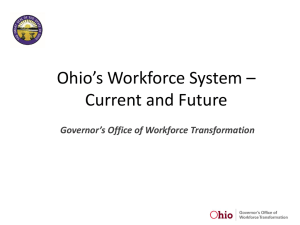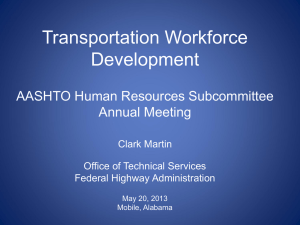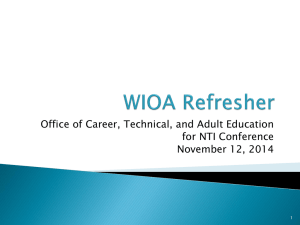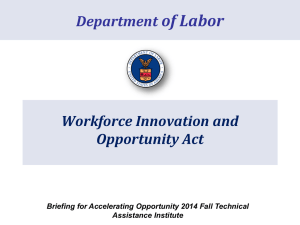WIOA_-_MWA_Conference_October_14_2014_
advertisement
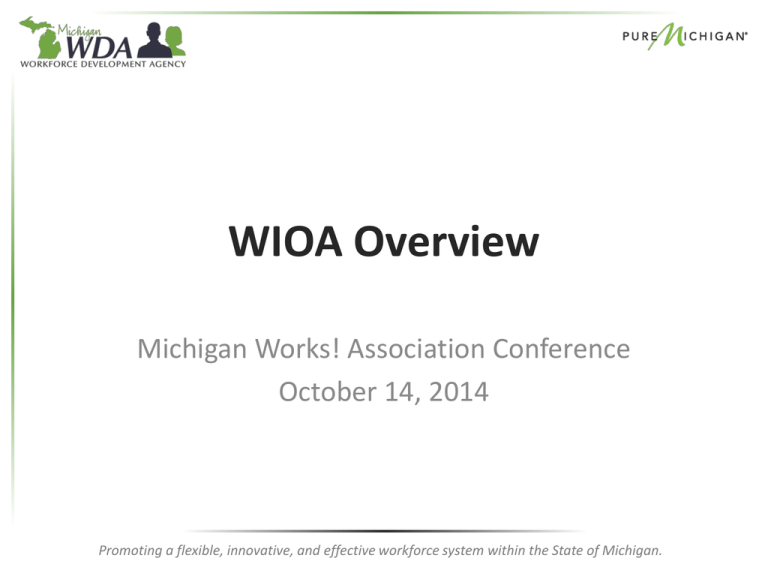
WIOA Overview Michigan Works! Association Conference October 14, 2014 Promoting a flexible, innovative, and effective workforce system within the State of Michigan. Six Broad Goals of WIOA (1) increasing access to and opportunities for the employment, education, training, and support services that individuals, particularly those with barriers to employment; 2 Six Broad Goals of WIOA (2) supporting the alignment of workforce investment, education and economic development systems in support of a comprehensive, accessible and high-quality workforce development system; 3 Six Broad Goals of WIOA (3) improving the quality and labor market relevance of workforce investment, education and economic development efforts; 4 Six Broad Goals of WIOA (4) promoting improvement in the structure and delivery of services; 5 Six Broad Goals of WIOA (5) increasing the prosperity of workers and employers; and 6 Six Broad Goals of WIOA (6) for purposes of title I, to provide workforce investment activities, through statewide and local workforce development systems, that increase the employment, retention, and earnings of participants, and increase attainment of recognized postsecondary credentials by participants, and as a result, improve the quality of the workforce, reduce welfare dependency, increase economic self-sufficiency, meet the skill requirements of employers, and enhance the productivity and competitiveness of the Nation. 7 Promotes accountability and transparency WIOA ensures that Federal investments in employment and training programs are evidence-based and data-driven, and accountable to participants and tax-payers. Core programs and other authorized programs are required to report on common performance indicators: Percentage of workers that entered employment Percentage of workers that retained employment Median wages of these workers Credential attainment of these workers Measurable skill gains of these workers Effectiveness of services to employers 8 Fosters regional collaboration WIOA promotes alignment of workforce development programs with regional economic development strategies to meet the needs of local and regional employers. States are required to identify regions within their state. Local areas in regions will have coordinated planning and service delivery strategies. 9 Improves services to individuals with disabilities WIOA increases individuals with disabilities’ access to high quality workforce services and prepares them for competitive integrated employment. • One-Stops will provide physical and programmatic accessibility to employment and training services for individuals with disabilities. • Youth with disabilities will receive extensive pre-employment transition services • State Voc Rehab will set aside funding to provide transition services to youth with disabilities. • engage employers to improve participant employment outcomes. 10 Strategic Alignment and Unified Planning Workforce Innovation and opportunity act Promoting a flexible, innovative, and effective workforce system within the State of Michigan. Improving One Stop Services Workforce Innovation and Opportunity Act Promoting a flexible, innovative, and effective workforce system within the State of Michigan. 12 Improves American Job Center system WIOA increases the quality and accessibility of services that job seekers and employers receive at their local One-Stops. Certification to ensure continuous improvement, access to services (including virtual services), and integrated service delivery. States/local areas will integrate intake, case management, and reporting systems, including fiscal and management accountability systems. 13 Services to Adults and Dislocated Workers Workforce Innovation and opportunity act Promoting a flexible, innovative, and effective workforce system within the State of Michigan. Enhances workforce services for adults and dislocated workers WIOA ensures that unemployed and other job seekers have access to high-quality workforce services. • WIA service categories of core and intensive services are collapsed into “career services” and there is no required sequence of services, enabling job seekers to access training immediately. • Local areas can transfer up to 100% of funds between Adult and Dislocated Worker programs. • Local areas can use up to 20 percent of their Adult and Dislocated Worker program funds for incumbent worker training programs. 15 Improves services to employers & promotes work-based training WIOA contributes to economic growth and business expansion by ensuring the workforce system is job-driven – matching employers with skilled individuals. State/local boards are responsible for activities to meet workforce needs of local and regional employers. State/local boards will promote use of industry and sector partnerships to address workforce needs of multiple employers within an industry. Local areas can use funds for proven work-based strategies, including incumbent worker training, Registered Apprenticeship, transitional jobs, on-the-job training, and customized training. There are increased reimbursement rates for employers for on-the-job and customized training. 16 Provides access to high quality training WIOA helps job seekers acquire industry-recognized credentials for in-demand jobs. Training that leads to industry recognized post-secondary credentials is emphasized. States/local areas will use career pathways to provide education and employment and training assistance to accelerate job seekers’ educational and career advancement. Local areas have additional procurement vehicles for training to increase customer choice and quality: individual training accounts, pay for performance contracts, and direct contracts with higher education. 17 Reinforces connections with registered apprenticeship • RA programs are included on eligible training provider list for Adult and Dislocated Worker programs as long as they remain registered. • State and local boards will have RA programs representatives as members. • RA completion certificates will be recognized as a post-secondary credential. • Youth program may offer pre-apprenticeship training to prepare youth for RA or other career opportunities. 18 Youth Services Workforce Innovation and Opportunity Act Promoting a flexible, innovative, and effective workforce system within the State of Michigan. Makes key investments for disconnected youth WIOA prepares vulnerable youth for successful employment through increasing use of proven service models. • Local areas must increase percentage of youth formula funds used to serve out-of-school youth to 75% from 30% under WIA. • Local areas must spend at least 20% of youth formula funds on work experience activities such as summer jobs, preapprenticeship, on-the-job training, and internships so that youth are prepared for employment. • Eligibility criteria are changed for the youth formula program: In school youth are ages 14-21 and out of school year are ages 16-24. • 5 new program elements to the youth formula program. • Additional allowable activities include financial literacy education and entrepreneurial skills training. 20 What it Means? Opportunities Workforce Innovation and Opportunity Act Promoting a flexible, innovative, and effective workforce system within the State of Michigan.




